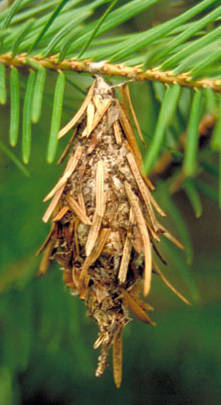Did you notice cone shaped bags hanging from your conifer shrubs or trees last fall? These are what are called bagworms. The female makes the cocoon, lays her eggs and waits for spring for them to hatch. Late May to early June is the time to control bagworms. As they say, the early bird gets the worm! The female will lay 300 to 1,000 eggs in each bag, which means they can produce large numbers of offspring in early summer.
Bagworms are in the bag all winter and emerge in spring. Late May and early June are a good time to control the bagworm caterpillar. Determine at what level of infestation you will need to spray. Sometimes you can tolerate a few bagworms, but if the population gets out of control this is the time to control them. Apply a pyrethroid such as permethrin or bifenthrin as they have a longer residual life than other insecticides.
Remember to not spray any blooming plants as you can inadvertently kill pollinators. Bacillus thuringiensis or BT is a natural control, as it only kills caterpillars. It may need to be re-applied. Always, read and follow label directions. For complete information on chemical control, refer to the North Carolina Agricultural Chemicals Manual. It is available on-line as a free download.
If you miss spraying in late May- early June, the next best method of control is to remove the bags when they develop. Be sure to carefully cut the silk band that holds the bag on the stem. If you do not it may remain and girdle the branch.
Looking for other more natural ways to control bagworms? Often native parasitic wasps that will control the bagworms. This natural control often keeps the bagworm population at a minimum, which is often tolerable. Your other option is select plant material that is not susceptible to bagworms. The preferred conifer plants for bagworms are Leyland cypress, arborvitae, cedar, juniper and pine, but they can feed on other species.
For information or if you have specific questions about plants in the landscape, garden or trees contact Shannon Newton, by email at Shannon_Newton@ncsu.edu or by phone at 910-277-2422 at Scotland County office of North Carolina Cooperative Extension.
Disclaimer: The use of brand names and any mention or listing of commercial products or services in this publication does not imply endorsement by North Carolina State University nor discrimination against similar products or services not mentioned.


